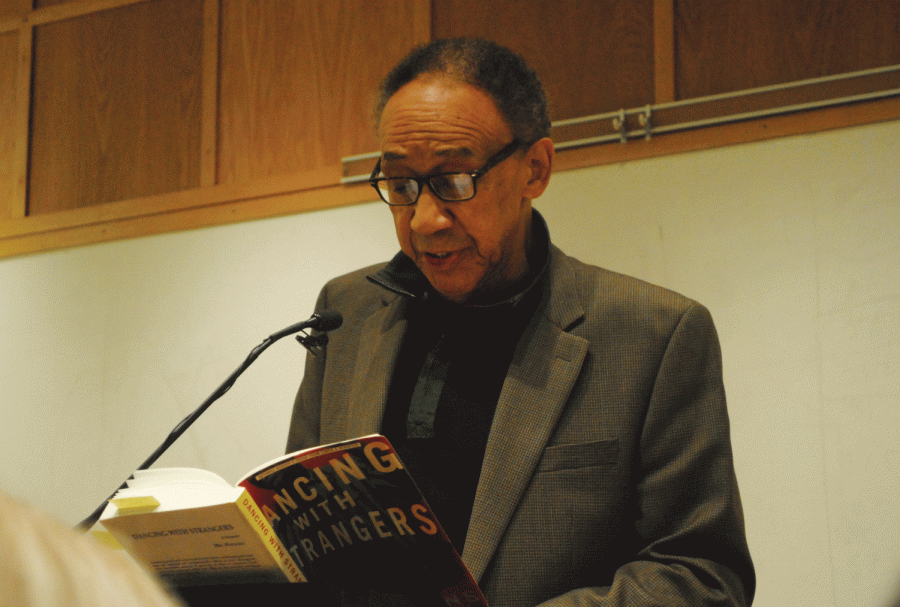Alumnus Professor Mel Watkins Preaches Acceptance in Living Writers Talk
Professor Mel Watkins, a Colgate alumnus, joined Colgate students and faculty on Thursday, September 27 to discuss his 1998 memoir, “Dancing with Strangers.”
Colgate NEH Professor of the Humanities in the Department of English Mel Watkins ’62 joined Colgate students and faculty on Thursday, September 27 to discuss his 1998 memoir, “Dancing with Strangers.” Watkins was the third guest in the Living Writers series, a semester-long course meant to examine contemporary literature while fostering an active dialogue with its authors.
Watkins, a Colgate alumnus, now teaches African American Humor in the English department of his alma mater. He is highly renowned in his field of study, having written seminal texts such as “On The Real Side” and “African American Humor.” Before he pursued academia, Watkins worked for over two decades at The New York Times’ Book Review, as the first black editor the paper had seen. It is there that he remembers learning how to truly write, a crucial skill for crafting his memoir.
Watkins sets the book’s first half in Youngstown, Ohio, the idyllic Midwestern city where he grew up. It is in Youngstown that he begins to see the duplicitous nature of racism that didn’t exist in the overt South or violent North. Rather than admit the true prejudice that poisoned most minds, the citizens maintained a polite relation between blacks and whites, as long as everyone maintained their assigned place in society.
“There was accepted and expected undercurrent of racism in a Midwestern upbringing” he said.
Much of the memoir focuses on Watkins’ struggle with that unacknowledged social order as well as how he defines himself within it. He first seeks answers from those around him. Populated with familial characters—such as Tennessee, his hustling father who wants a better life for his son, or Miss Aggie, the grandmother who tells old slave tales about dancing for white masters and “gettin’ ovah”—the milieu of his childhood brims with life lessons that he only began to decipher later. Ultimately, Watkins takes solace in the existentialist doctrine of self-definition, looking inward to carve out his own identity.
While still figuring out that identity, Watkins moves into his collegiate days. As one of five black students in his class, he saw a similar pattern of racism masked by politeness.
“His experiences at Colgate were both shocking and, unfortunately, unsurprising to learn about,” sophomore Carina Haden said. “College campuses are often seen as bubbles inside of which the ills of the world around it are impotent. While this is true in some cases, it is clear that the virulence of racism had a large effect on this campus not too long ago.”
Watkins filled his lecture with excerpts from the memoir that gave credence to this sentiment. His basketball teammates called him racial slurs behind his back. The fraternities, pretending to act interested in his membership, knew they would never offer him a bid.
Between these stories of discrimination were humorous anecdotes meant to filter such a heavy topic through the lens of comedy. Watkins reminded students that if one forgets the absurdity of racism, it becomes easy to get bogged down by it. To laugh is a way to deal with that reality. He and his childhood friend lassoed minstrel lawn jockeys from upper-class white lawns, watching the police investigate as if a real person had been injured. He challenged a black musician at an almost all-white party to a dance-off, only to be shown up by a no-hands spin and split. Watkins moved the audience to empathy through laughter with moments like these.
“It was refreshing to hear a professor get really personal,” sophomore Megan Nicholson, a student of Watkins’ African American Humor course, said. “If this wasn’t an example of one professor forming a sense of a personal relationship with his students, I don’t know what is.”
Watkins ended his talk with the message that culture and entertainment were, and still are, influential in expediting the integration of African Americans into America. Dancing, music and comedy all remain ways to change that toxic mindset that remains latent under a guise of hospitality and acceptance.
Contact Andrew Kish at [email protected].






